Dark Passage (1947)
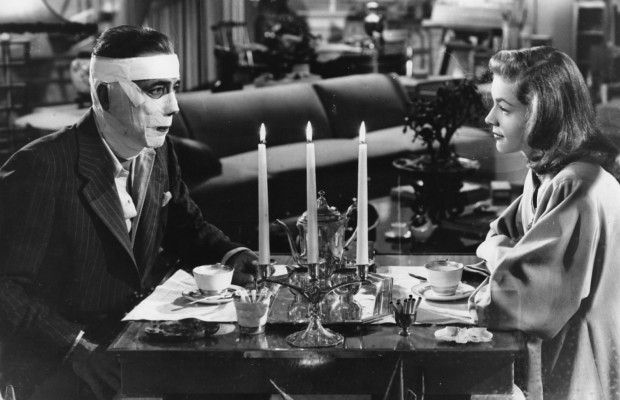
Toronto Film Society presented Dark Passage (1947) on Sunday, January 12, 1986 in a double bill with They Won’t Forget as part of the Season 38 Sunday Afternoon Film Buffs Series “A”, Programme 5.
Production Company: Warner Brothers. Director: Delmar Daves. Producer: Jerry Wald. Screenplay: Delmar Daves, based on David Goodis’ novel. Cinematographer: Sid Hickox. Film Editor: David Weisbart. Music: Franz Waxman. Assistant Director: Dick Mayberry. Art Director: Charles H. Clakre. Set Decorations: William Kuehl. Wardrobe: Bernard Newman. Make-up Artist: Perc Westmore. Special Effects: H.F. Koenekamp. Sound Recorder: Dolph Thomas. Orchestrations: Leonid Raab.
Cast: Humphrey Bogart (Vincent Parry), Lauren Bacall (Irene Jansen), Bruce Bennett (Bob Rapf), Agnes Moorehead (Madge Rapf), Tom D’Andrea (Sam, the cabman), Clifton Young (Baker), Douglas Kennedy (Detective), Rory Mallinson (George Fellsinger), Houseley Stevenson (Dr. Walter Doley).
Humphrey Bogart and Lauren Bacall made four films together–To Have and Have Not (1944), The Big Sleep (1946), Dark Passage (1947) and Key Largo (1948). Dark Passage has almost universally been considered as the one minor item in the quartet. Terence Pettigrew, in his survey of Bogart’s career, however, describes it as “one of the great atmospheric thrillers of the forties, unfairly half-hidden by the bluster and ballyhoo of earlier Bogart-Bacall collaborations.” Pettigrew finds support from a group of young French surrealists who hailed it in the early 50’s as a masterpiece of l’amour fou.
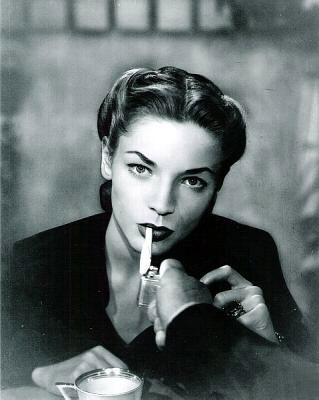
The film tells the story of a man falsely convicted of the murder of his wife, who escapes from prison and seeks to find the true killer. He is hidden by a young painter in her apartment, at the same time undergoing facial surgery to enable him to hide from the police. After a series of remarkable and highly improbably plot contrivances, the man tracks down the true murderer though she dies before she can clear him, forcing him to flee to South America with the young painter. Pettigrew points to the Bogart-Bacall relationship as the film’s true core: “The diverting love affair between the two tough central characters, set against equally tough, uncompromising backgrounds is what gives Dark Passage true depth and breadth….(This film) gets closer to laying bare the heart of that robust partnership than practically anything else they appeared in or subsequently had written about them.” While there is less witty exchange in the film than in previous Bogart-Bacall collaborations, Pettigrew and others have felt that Bacall emerges as a much stronger character. The plot is so highly improbably, however, as to have encouraged symbolic and allegorical explanations of the film. Jean-Pierre Coursodon writes: “Dark Passage is actually easier to deal with in terms of fairy tale, myth, and poetry of the unconscious than as a traditional crime melodrama. Thrillers are often ‘marred’ by improbabilities, but the plot of Dark Passage is so consistent in its disregard of verisimilitude that unlikelihood, rather than a hindrance, becomes the film’s structural principle, and its sequence of events takes on the compelling inevitability of dreams….The film’s basic theme is physical and spiritual rebirth, and the first half of the story unfolds as a sustained metaphor of embryonic or fetal life. Until he has been operated on, the hero remains, visually, in limbo; he is literally kept out of the picture, as the camera itself takes his place….In the subsequent period of gestation, a woman shelters him in a womb-like apartment from which intruders are excluded, feeds him liquid through the umbilical cord of a glass tube, and finally gives birth to the new man when she removes his bandages.” Coursodon’s suggestions are interesting, but the use of the subjective camera technique in the first portion of the film probably owes as much to Warner Brothers’ desire to capitalize on t\he publicity granted MGM’s Lad in the Lake, released the same year.
Agnes Moorehead won particular praise for her role in this film, with several critics wishing it had been larger. She plays an embittered, neurotic woman, in a role that recalls her part in Welles The Magnificent Ambersons, five years earlier.
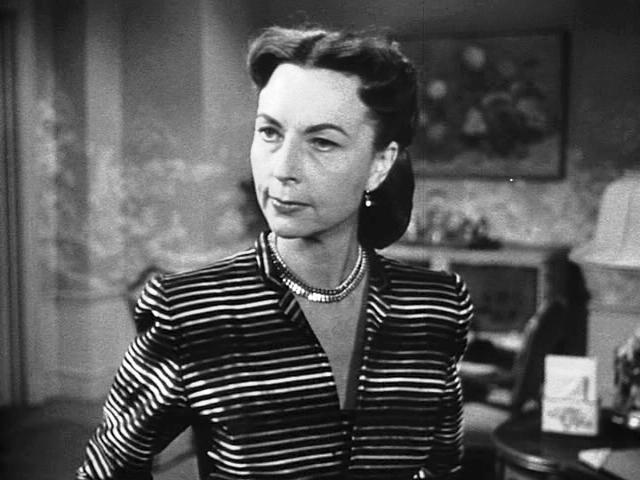
It seems only fair to let Pauline Kael have the last word, as one critic who violently disliked the film: “‘Dark’ in a movie title generally seems to be an attempt to give some sinister allure to opacity and confusion, as in The Dark Corner, Dark Waters, The Dark Mirror. This Bogart-Bacall bummer is no exception. Throughout most of the miserably plotted picture, Bogart, accused of murder, hides out in Bacall’s fashionable San Francisco apartment while recovering from plastic surgery; with his head bandaged, he can’t do much except nod appreciatively while Bacall feeds him through a glass straw. In moments of stress, she dilates her nostrils; he’s so trussed up he can’t even do that. The picture is an almost total drag.” In spite of this scathing review, TFS leave it to you to decide on this one!
Notes by Laurie McNeice

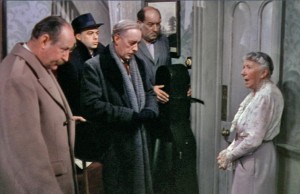
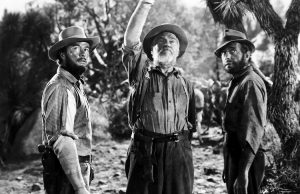
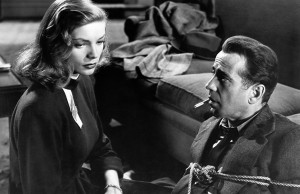






Leave a Reply